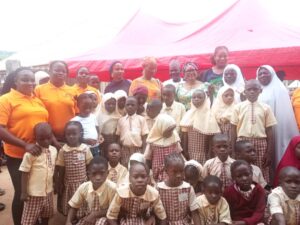In a world disrupted by technology and information, the Chief Executive Officer (CEO) of the National Library of Nigeria (NLN), Professor Chinwe Anunobi has urged Nigerians to strive for basic literacy.
Referencing UNESCO definition of basic literacy, Anunobi said it is the ability to read and write not just in English language, but also the ability to read and write in one’s indigenous language, and the knowledge of basic numeracy.
Anunobi who spoke during the apex library’s outreach programme to the Karshi Community Library, in Abuja, yesterday, highlighted the urgent need for both government, individuals, philanthropists and civil societies to invest in basic and adult education in the country.
These include UNESCO, September 2021 report which placed Nigeria’s adult literacy at 62%, which means that 38% of Nigerian adults cannot read or write. Gender disparity indicates that adult male literacy in Nigeria stands at 71% compared to adult female literacy (53%). Similarly, the United Nations Human Development Index ranks Nigeria 161 of 189 nations, a position well below Ethiopia and the diamond controversial Democratic Republic of Congo, and below average for sub-Saharan nations.

With basic literacy skill, Anunobi said, one can contribute positively to governance, and have their voices heard. It also helps improve lifestyle and opens up opportunities for one to advance up the socio-economic ladder.
And from basic literacy, one can level up to average literacy skill.
“Every child and adult should have average literacy skill to be a part of governance, politics and decision-making processes of governance, voting included.
“The average literacy level is the ability to read and write not just in English but your own indigenous language. It is the ability to be able to read and understand a book written in your native tongue, and give your opinions about it.”
Commending the Karshi traditional ruler, His Royal Highness (HRH), Alhaji Ismaila Danladi Mohammed initiative to establishing the Karshi Community Library 29 years ago (1994), she encouraged other communities to borrow a leaf from Karshi.
To bridge the literacy gap in the nation, Anunobi urged collaboration amongst individuals, communities and the government in the promotion of all forms of literacy (indigenous and English language), investment in education, community engagement and leveraging on technology.
“We must use technology to increase access to educational resources and improve digital literacy. In an environment that is getting more complex, literacy enables people to adapt, innovate and make wise judgements,” concluded Anunobi.
The apex library donated sets of fiction novel, and basic education textbooks in English as well as Hausa language to the community library.
The event was attended by over 60 pupils from four primary schools in the community, their mothers, in addition to the traditional ruler, and his retinue.
The event marks the library’s second outreach programme to hinterland communities to promote the importance of literacy, since Anunobi’s resumption of office a year ago, the first being a visit on world literacy to the 100 A Day School in Kuje, Abuja.
We’ve got the edge. Get real-time reports, breaking scoops, and exclusive angles delivered straight to your phone. Don’t settle for stale news. Join LEADERSHIP NEWS on WhatsApp for 24/7 updates →
Join Our WhatsApp Channel










